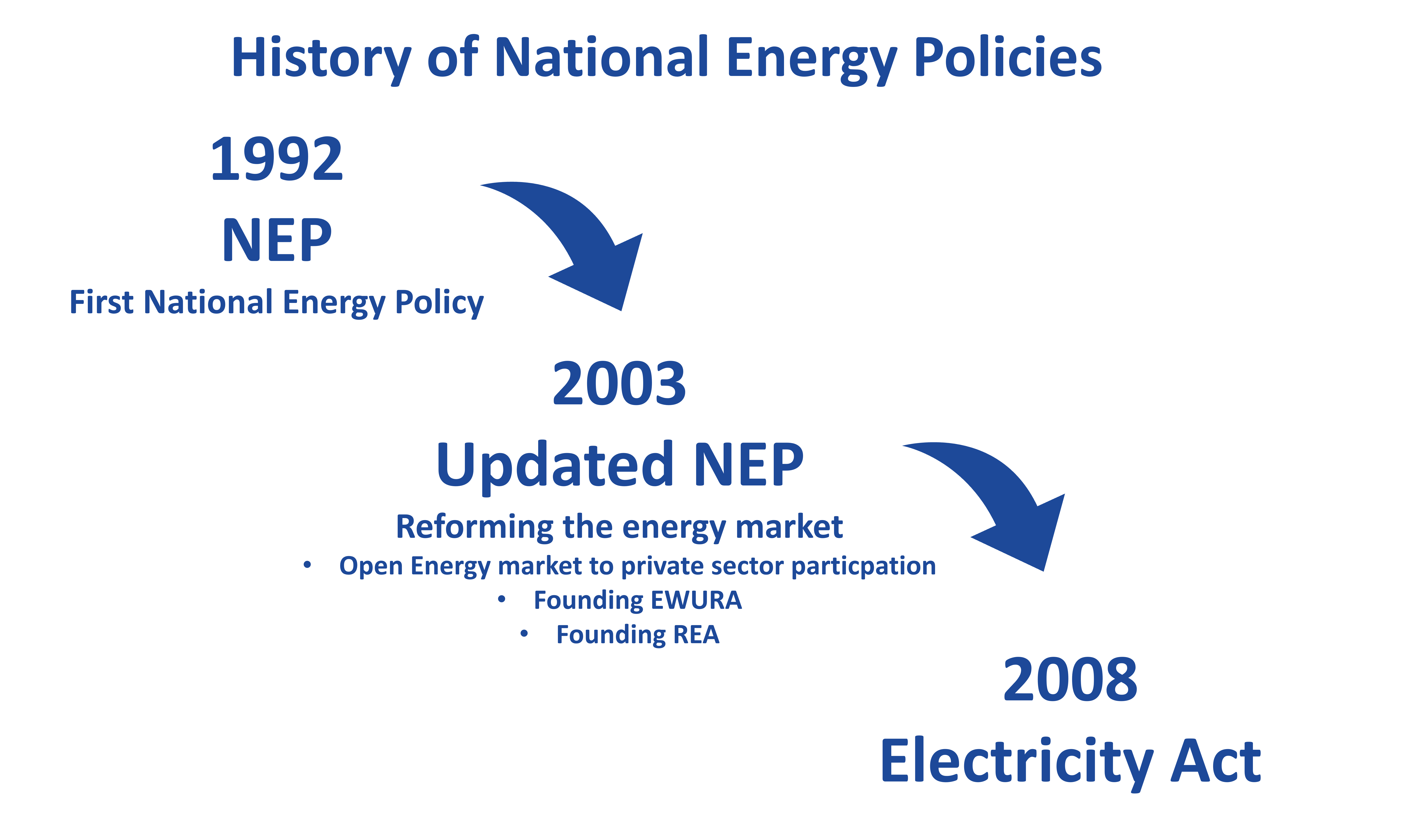
A Brief
History of Energy in Tanzania
The road from
a colonial to post-colonial energy system
The first public
electricity supply in Tanzania was established by the German colonialists in
1908 (by then Tanganyika) and served the railway workshops and towns where the
colonialists were mostly staying (Edward
and Hard, 2019). During colonial eras, electricity lines were installed
directed to productive areas such as industries owned by colonial powers
(Chaplin et al., 2017). In rare cases electricity was installed
to improve livelihoods and ensure social services of community households. The
role of electricity in promoting productivity at household levels remained
limited and thus impaired contribution of economic growth from household
livelihood activities. It is under this circumstance many of households in
Tanzania remained with no access to electricity. However, after independence in 1961 the first government of Tanganyika came
up with an intention to develop the national electricity generation for
domestic, industrial use and to promote irrigation of rural agricultural land.
Potential foreign partners and engineers were invited and were given an
opportunity to support. However, in the process they changed the main focus to
concentrate on hydropower alone and agriculture was not given priority.
Consequently, the British dominance in the power sector was replaced by others
such as Swedish and earlier knowledge produced by British colonial officers was
disregarded. Discounting previous knowledge had its implications on future
energy sector development.
The birth of TANESCO
Empower communities by
access to energy
In 1964, the Tanzania
Electric Supply Company (TANESCO) was formed as a public power utility. Electricity
was seen as an essential element for improving livelihoods in rural areas and
hence limit both rural-urban migration and deforestation (Chaplin et al., 2017)
which were at an alarming rate. TANESCO was tasked to undertake studies and
start planning new power projects to meet the increasing industrial,
commercial, and rural township power supply demands. It was during this time;
large-scale hydroelectric plants were built and subsidized by the government to
reduce costs from imported fossil fuel (Cook et al. 2015).
A bumpy road toward energy for everyone
The
challenges of transforming an industry-focused colonial energy system
However,
it does not need to be emphasised that the process to increase electricity
access in rural areas of Tanzania, remained focused on areas which were considered
productive, towns and for decades has ignored rural areas. This shows how the
colonial system in the energy sector continued to influence energy provisions
in the country. Projects that intended to electrify rural areas were supported
by donors or had slow advancement. Still in rural areas electricity was neither
used to increase productivity nor serve the cooking and heating sectors. Even
in some rural areas where households had access to electricity, it was only
used for lighting (Bernard, 2012). Rural electrification did not increase a
number of households with connections due to high prices and did not reduce
reliance on wood (Bernard, 2012. Chaplin et al., 2017). Deforestation rates linked to unsustainable use of biomass
was thought to increase and rural-urban migration did not slow down. In
the period of 1980s and early 1990s, Tanzania switched to structural adjustment
policies where government and donor-funding rural electrification projects were
significantly reduced. It was learnt that large-scale projects to expand grid to
rural areas were expensive and increased debts to the state-owned utility
company (Bernard, 2012).
The History of National Energy Policies
Promote productive use of energy
In general, all efforts
failed to increase access and promote productive use of energy in rural areas and
particularly at household levels, this is considered to
be one of the reasons for existing poverty (CANTZ, 20219; Garcia et al.,
2017). In 1992, the government formulated the first National Energy Policy
(NEP) as a response to socio-economic reforms which happened in 1990s (URT;
2015). In the early 2000s, NEP was re-formulated and launched in 2003 with an
intention of reforming the energy market and attracting private sector
participation in the Sector (URT, 2015). It was through the implementation of NEP,
2003; Energy and Water Utilities Regulatory Authority (EWURA) was established;
Rural Energy Agency (REA) and
Rural Energy Fund (REF) became operational. Both Small Power Purchase
Agreements (SPPA) and the Electricity Act 2008 were formulated.
Energy for Development
A key to fight poverty
Since the 1990s, energy
has been explained as one of the important socio-economic transformation
enablers. It
has since been considered both in the Millennium Development Goals and
Sustainable Development Goals as an important instrument to fight poverty and
hunger, enhancing education, health, transport, empowering women, ensuring
access to water and decent jobs. The utilisation and promotion of renewable
energy and energy efficiency are among the SDGs and well linked to the Paris climate
agreement. Renewable energy and energy efficiency are also considered to be
important in addressing energy poverty and building resilience to rural and off
grid communities. Decentralised energy and especially utilising local renewable
energy sources are now widely accepted to ensure sustainable development. Despite
their emphasis documentation in many national plans and agenda, their
implementation has been lagging significantly. The current legislations in the
energy sector have less emphasis on amplifying the role of renewable energy and
decentralising energy compared to grid extension. If the abundant renewable
energy sources are not utilized the current plans may not meet present and
emerging energy demands and sector challenges.
(This section is part of the Policy Recommendation Report that analysis the landscape of the Energy Sector and Policy in Tanzania. Learn more about it here: https://cantz.or.tz/publications/20 )
